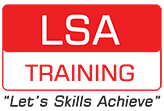
About Course
Databricks training are having a basic understanding of distributed computing systems and databases, as well as basic knowledge of the programming language Python. Knowledge of SQL, Apache Spark, and machine learning will be beneficial, but not required.
- Our Recruitment company details and open roles:https://lsarecruit.zohorecruit.in/careers
Duration: 1month ( Mon to fri, Sat & Sun 9am to 2pm ) - For fee and job assistance please call us on : 02033710546 or 07843259631 Email us : training@Lsatraining.co.uk
- Course Description
- Course Overview
- Highlights
Course Prerequisites
The prerequisites for Databricks training are having a basic understanding of distributed computing systems and databases, as well as basic knowledge of the programming language Python. Knowledge of SQL, Apache Spark, and machine learning will be beneficial, but not required.
Target Audience:
The target audience for Databricks training is people who have an interest in broadening their knowledge of big data and analytics
This training course is ideal for current and aspiring data scientists, data engineers, data analysts, and software developers
Business and technical professionals who have a working knowledge of data processing, analytics, and related technologies, such as Apache Spark and Python, can also benefit from this training
Additionally, those in DevOps or cloud computing who are interested in deploying or managing large-scale distributed systems are also welcome
These classes are designed to provide an intensive introduction to the Databricks Unified Data Analytics Platform
The training is intended to draw on best practices and modern practices to maximize potential performance, using tailored example applications to provide hands-on experience
This training is perfect for individuals and teams including data engineers, data scientists, software developers, and DevOps engineers
Whether you are new to data engineering and data science or a seasoned professional, there is something for everyone
Become an expert in the tools and techniques that are essential for working with large-scale datasets in an effective and efficient manner
Placement assistance program through LSA Recruit:
At LSA TRAINING, we are committed to helping our students secure suitable job opportunities through our comprehensive Placement Assistance Program.
Key Features of the Program:
1. Scope: Our program assists LSA Training students in finding jobs in their desired industry sectors and roles.
2. Target Audience: Open to students who have successfully completed their training with LSA.
3. Employer Database: We maintain a database of potential employers relevant to students' skills and interests.
4. Partnerships: We establish partnerships with employers, attend career fairs, and participate in industry events to facilitate job placements.
5. Candidate Profiles: Detailed profiles are created outlining students' skills, knowledge, experience, and qualifications.
6. Career Coaching: We offer career advice, resume development, and interview preparation services.
7. Job Matching: Students are matched with potential employers based on their profiles and job requirements.
8. Interview Arrangements: We coordinate interviews between students and employers.
9. Feedback: Post-interview feedback is provided to help students improve their job search skills.
10. Success Monitoring: We track the success rate of placements and gather feedback from students and employers to continuously improve our services.
Contact Us:
For more details on our Recruitment Program, visit [www.Lsarecruit.co.uk], call us at +44 02039501453, or email us at Careers@Lsarecruit.co.uk.
Empower your career with LSA TRAINING and LSA Recruit.
Learning Objectives of Databricks
1. Understand how to set up and manage a Databricks workspace.
2. Learn how to interact with Apache Spark using the PySpark programming language.
3. Become familiar with Databricks notebooks and how they can be used to develop and debug Apache Spark code.
4. Understand the concept of Data Frames and how they are used in Apache Spark.
5. Learn how to use the MLib machine learning library to build models using Apache Spark.
6. Leverage MLFlow to deploy models and track model history.
7. Understand best practices for data analysis and machine learning in Databricks.
8. Learn how to optimize Spark for maximum performance.
9. Explore various security and governance features available in Databricks.
10. Get certified as a Databricks Developer.
- How do we define Big Data?
- Spark languages – Scala, Python, R, Java, SQL
- Databricks Community Edition
- Databricks Architecture
- Defining Data Analytics
- Defining Machine Learning
- Azure implementation
- AWS implementation
- Integrating into Pipelines
- Creating a Databricks Workspace on Azure
- Creating and configuring your Cluster
- Creating and attaching your first Notebook
- Testing your Notebook
- Connecting to a Spark data source
- Previewing your Table
- Columns and Datatypes basics
- Writing the initial SQL query to import
- View aggregates
- Perform Joins
- Datatypes
- Structured Streaming DataFrames
- Plots
- Choosing Chart types
- Chart Toolbar
- Layout and styling considerations
- Machine Learning visualisations
- View Jobs and Job details
- Running your first Job
- Viewing completed jobs
- Setting up Alerts
- Getting data into Delta Lake
- Delete, update, merge
- Overview of Delta Engine
Training Highlights
Interactive Learning: Enhanced interaction between students and faculty, as well as among students.
Comprehensive Materials: Detailed presentations with soft copy materials available for reference at any time.
Practical and Job-Oriented Training: Focus on practical skills with hands-on practice using software tools and real-time project scenarios.
Preparation for Interviews: Includes mock interviews, group discussions, and interview-related questions.
Cloud-Based Test Lab: Access to a cloud-based test lab for practicing software tools as needed.
Real-Time Project Domains: Discussions on real-time project domains to provide relevant context and experience.
Current Market Relevance: Teaching methods, tools, and topics are selected based on the current competitive job market.
Additional Course Benefits
Hands-On Experience: Gain practical experience with industry-relevant tools and techniques.
Real-Time Project Work: Work on real-time projects to build your portfolio and practical knowledge.
Interview-Based Training: Tailored training to help you excel in job interviews.
Expected Salary/Pay Package Guidance:
Contractors: £400 to £600 per day, depending on experience and skill set.
Permanent Positions: £50,000 to £100,000 per annum, based on experience and skills.

